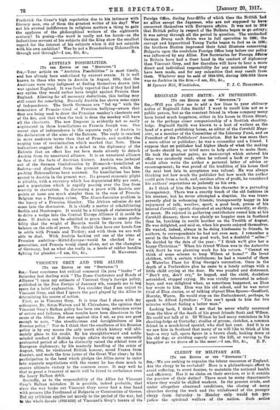VISCOUNT GREY AND THE ALLIES.
[To THZ EDITOR or THE " SPECTATOR."]
Bra,—Your courteous but critical comment (in your "leader" of Saturday last dealing with " The Rome Conference and Bonds of Alliance ") upon my estimate of Viscount Grey's foreign policy, published in the New Europe of January 4th, compels me to beg space for a brief explanation. You consider that I am unjust to Viscount Grey, and that I ignore the part played by the Allies in determining his course of action.
First, as to Viscount Grey. It is true that I share with my colleagues, Dr. Seton-Watson and M. Cheradame, the opinion that Viscount Grey's Balkan policy has been one long, unbroken series of errors and failures, whose results have been disastrous to the cause of the Allies. But over against this I set, as you are good enough to note, "the steadfastness and farsightedness of his Russian policy." Nor do I think that the excellence of his Russian policy is by any means the only merit which history will ulti- mately place to his credit. By his straightforward and noble- minded conduct of British foreign affairs during an unusually protracted period of office he distinctly raised the ethical tone of European diplomacy; by his masterly handling of the crisis of August, 1914, he vindicated British honour, saved France from disaster, and made the true issues of the Great War clear; by his participation in the bond which pledgee the Allies never to enter Into separate negotiations with the enemy he has done much to ensure ultimate victory to the common cause. It may well be that so great a treasury of merit will be found to outbalance even the heavy Balkan debit.
Secondly, as to the responsibility of the Allies for Viscount Grey's Balkan mistakes. It is possible, indeed probable, that since the war brake out Viscount Grey never had a free hand with persons like Ferdinand of Bulgaria or Constantine of Greece. But my criticism applies not merely to the period of the war, but to the whole decade (1906-1916) of Viscount's Grey's tenure of the Foreign Office, during four-fifths of which time the British had no allies except the Japanese, who are not supposed to have) concerned themselves with European affairs. It was not in 1914 that British policy in respect of the Balkans began be go astray; it was astray through all the period in question. The unchecked' German Drang nach Oaten was in full operation in 1906; the corrupt and hypocritical. Young Turks began to fool us in 1908; the brothers Buxton impressed their fatal illusions concerning. Bulgaria upon the credulous Foreign Office long before our policy was influenced by any Allies. Few Secretaries for Foreign Affairs' in Britain have had a freer hand in the conduct of diplomacy' than Viscount Grey, and few therefore will have to bear a more direct and individual• responsibility for any mistakes that may have been made, and for any calamities that may result from them. Whatever may be said of 1914-1914 during 1906-1914 there was no Jerkins in the firm.—I am, Sir, &c.,


































 Previous page
Previous page